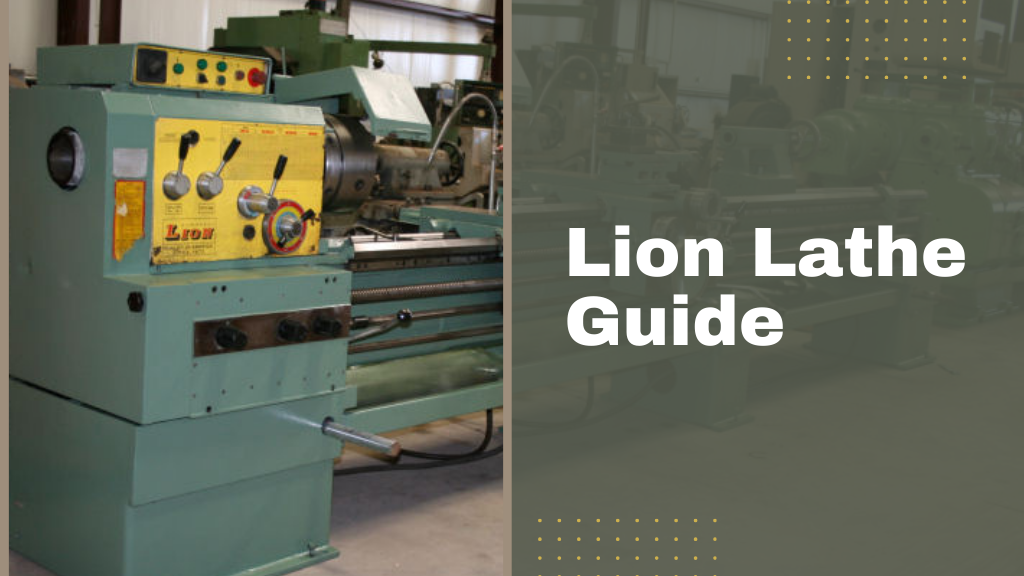A lathe is one of the most important machines in metalworking, and among the many brands available, Lion Lathe has built a strong reputation for durability, accuracy, and long-term performance. Whether you are a machinist, an engineering student, or a business owner in the manufacturing industry, understanding Lion Lathes can help you make informed decisions about purchasing, operating, or maintaining these machines.
In this detailed guide, we will cover everything you need to know about Lion Lathes, including Lion Lathe parts, maintenance tips, pricing, and a step-by-step Lion Lathe guide to help you choose the right model for your needs.
What is a Lion Lathe
A Lion Lathe is a precision machine tool designed to rotate a workpiece on its axis, allowing operators to perform various operations such as cutting, sanding, knurling, drilling, or deformation. What sets Lion apart from other lathe manufacturers is its commitment to combining high quality European engineering with user friendly operation.
Founded in Europe, Lion Lathes have been popular in machine shops, vocational schools, and factories for decades. Known for their robust build, smooth performance, and long service life, these machines are widely considered a reliable investment for both small and large-scale machining operations.
Key Offerings of Lion Lathe
Lion Lathes come in different models, each designed to meet specific industrial requirements. Some of their most notable offerings include:
- Engine Lathes designed for professional workshops.
- Precision Lathes used in tool rooms, research labs, and training schools.
- Manual Lathes suitable for operators who prefer hands-on machining with direct control.
- Specialized CNC-Compatible Lathes designed for integration with modern computer-controlled manufacturing.
These machines are praised for their long-term reliability, low vibration, and ability to handle both soft and hardened metals.
Lion Lathe Parts: What You Need to Know
Every lathe machine consists of several critical components that ensure accurate machining. Understanding the key Lion Lathe parts is essential for maintenance and operation.
Main Parts of a Lion Lathe
- Bed: The heavy base that supports the machine.
- Headstock: Houses the spindle, gears, and drive mechanism.
- Tailstock: Supports the other end of the workpiece and can hold drilling tools.
- Carriage: Moves along the bed to hold and guide the cutting tool.
- Lead Screw and Feed Rod: Essential for threading and power feed operations.
- Chuck: Holds the workpiece securely during machining.
- Tool Post: Mounts the cutting tool and allows adjustments.
- Apron: Controls the movement of the carriage and feed.
Accessories and Replacement Parts
In addition to these main components, users often require:
- Change gears
- Steady and follow rests
- Collet chucks
- Tool holders
- Coolant systems
Lion Lathe parts are available through authorized distributors and machine tool suppliers.
Why Choose a Lion Lathe
When it comes to investing in a lathe, quality and reliability are two of the most important factors to consider. Lion Lathes have built a strong reputation in the machining world for delivering both. Whether used in training environments or industrial workshops, they are recognized for performance and longevity.
-
Durability
Lion Lathes are built with cast iron beds and high-grade steel components, ensuring they can withstand years of heavy use. This robust construction minimizes vibrations during operation, leading to better machining results. Their durability makes them a long-term investment for both small shops and large-scale industries.
-
Accuracy
Precision engineering is at the heart of every Lion Lathe. They are designed with tight tolerances, allowing machinists to produce accurate and consistent parts. This reliability is especially important in industries where even the smallest deviation can affect the final product.
-
Ease of Maintenance
Unlike some modern machines with overly complex systems, Lion Lathes feature straightforward designs. This makes maintenance simpler, with spare parts readily available when needed. Operators and technicians can easily keep them in excellent working condition, reducing downtime.
-
Proven History
Lion Lathes have been trusted for decades in schools, vocational training centers, and industries. Their long-standing reputation proves their reliability and effectiveness in teaching environments as well as production floors. They continue to be a popular choice for machinists worldwide.
-
Strong Resale Value
Because of their solid build and brand reputation, Lion Lathes hold their value over time. Many buyers are willing to pay a premium for a used Lion Lathe due to its long service life and proven reliability. This makes them not just a machine purchase, but also a wise financial investment.
Lion Lathe Guide: How to Choose the Right Model
Selecting the right lathe depends on your intended use, budget, and skill level. This Lion Lathe guide will help narrow down your options.
1. Define Your Purpose
Before choosing a Lion Lathe, clearly define what you will use it for. If you are a beginner or using it for training, a small precision model is ideal. Industrial applications require heavy duty engine lathes, while repair shops can usually work well with manual models. Matching the lathe to your purpose ensures efficiency.
2. Consider the Workpiece Size
Workpiece dimensions are one of the most important factors in selecting a lathe. The swing over bed determines the maximum diameter of the material, while the distance between centers defines the maximum length you can turn. Always choose a lathe that comfortably handles your typical projects.
3. Power and Speed
The right combination of horsepower and spindle speed is crucial for effective machining. Look for a Lion Lathe model that offers variable spindle speeds, allowing flexibility for different materials. Higher horsepower provides the strength needed for tougher metals, while precise speed control ensures accuracy in delicate operations.
4. Budget and Pricing
Lion Lathes are available in different price ranges depending on size, model, and condition. Smaller training lathes are more affordable, while large industrial versions are a bigger investment. Always balance your budget with your intended use to get the best value without overspending.
Lion Lathe Price: What to Expect
When it comes to purchasing a Lion Lathe, prices can vary significantly based on whether you are buying new or used. Understanding these ranges helps buyers set realistic expectations and make informed decisions.
-
New Lion Lathes
New Lion Lathes usually range from $10,000 to $40,000 or more depending on the model, size, and specifications. Industrial-grade models designed for heavy-duty machining are typically on the higher end of this price spectrum.
-
Used Lion Lathes
If you are on a tighter budget, used Lion Lathes are a strong option. Prices generally range between $3,000 and $15,000, depending on the machine’s condition, age, and included accessories. A well-maintained used lathe can still deliver reliable performance.
-
Spare Parts and Accessories
Additional costs should also be considered for spare parts and accessories. Items such as chucks, gears, tool holders, and attachments typically fall within the $50 to $500 range, depending on quality and type.
-
Buying Considerations
Before making a purchase, always check the machine’s service history, inspect wear on the bed and lead screw, and verify the availability of replacement parts. For new purchases, confirming warranty coverage is also important for long-term reliability.
Maintenance Tips for Longevity
To get the most out of your Lion Lathe, regular maintenance is essential.
-
Importance of Regular Maintenance
To get the best performance and durability from your Lion Lathe, regular maintenance is essential. A well-maintained machine not only runs smoothly but also reduces the chances of costly repairs in the future. Consistent care helps maintain accuracy and ensures you get maximum value from your investment.
-
Lubrication of Moving Parts
Lubrication plays a vital role in reducing wear on moving parts. Always check and apply the recommended lubricants at regular intervals. This keeps the machine running smoothly and prevents excessive friction that can damage the components. A proper lubrication schedule extends the overall lifespan of your lathe.
-
Alignment Checks
Another important step is alignment checks of the headstock and tailstock. Even slight misalignment can affect precision and cause machining errors. Periodically verifying and correcting alignment ensures your lathe continues to deliver accurate results. This practice is especially important if the machine is used heavily.
-
Coolant Replacement
Coolant replacement should not be overlooked, as old coolant can lead to bacterial growth and reduced cutting performance. Draining and replacing coolant at scheduled intervals helps maintain efficiency and keeps the cooling system clean. Clean coolant also prevents clogging in pipes and protects the cutting tools.
-
Cleaning and Inspection
Daily cleaning after each use is equally important for long-term performance. Removing chips, oil, and dust prevents rust buildup and ensures the bed and guides remain smooth. Along with cleaning, inspect belts, gears, and bearings regularly. Replacing worn parts on time avoids sudden breakdowns and keeps the machine reliable.
Real-World Applications of Lion Lathe
Lion Lathes are used in a wide variety of industries, including:
- Aerospace for manufacturing precision components.
- Automotive for repairing shafts, gears, and mechanical parts.
- Education for training students in machining technology.
- General Metalworking Shops for producing custom parts.
Case Example: A mid-sized automotive workshop in the United States invested in a Lion engine lathe to handle custom shaft repairs. Within six months, they reported a 20 percent increase in efficiency due to reduced outsourcing costs.
Comparing Lion Lathe with Other Brands
While brands like Haas, Grizzly, and Jet are popular, Lion Lathes are known for their European build quality and heavy-duty performance. Unlike budget models, they are built to last for decades with proper care and consistent maintenance.
Expanding the Lion Lathe Guide: Tips for Buyers
When purchasing a Lion Lathe, consider these additional tips:
-
Check Manufacturing Year and Model Number
When buying a Lion Lathe, always confirm the manufacturing year and model number. This ensures you know the machine’s exact specifications and availability of spare parts. Older models may lack certain modern improvements, so knowing the details helps you make an informed choice.
-
Inspect Wear on Used Machines
For buyers considering a second-hand lathe, carefully check wear on guideways, lead screws, and spindles. These are critical components that directly affect accuracy and smooth operation. Excessive wear can lead to alignment issues and higher maintenance costs in the long run.
-
Request a Live Demonstration
Whenever possible, ask for a live demonstration of the lathe before making the purchase. Watching the machine in action allows you to assess its noise level, vibration, and cutting performance. It also provides confidence that the lathe is in good working condition.
-
Consider Transportation and Installation
Lion Lathes are heavy-duty machines that require careful handling during transport and installation. Buyers should factor in these costs when budgeting for the purchase. Professional movers or riggers may be needed to safely deliver and set up the machine in your workshop.
-
Match Electrical Requirements
Before finalizing your purchase, ensure that the lathe’s electrical requirements match your workshop’s power capacity. Some models may require higher voltage or three-phase electricity. Checking compatibility in advance prevents unexpected expenses and delays during installation.
Training and Safety for Lion Lathe Operators
Operating a Lion Lathe requires skill and attention to safety.
- Wear protective eyewear and gloves.
- Keep hair and loose clothing secured.
- Never leave the machine running unattended.
- Use guards and shields whenever available.
- Train all operators in basic safety protocols and emergency procedures.
Long-Term Value of Lion Lathe
A Lion Lathe is not just a purchase but an investment. These machines are known to last twenty to thirty years with proper care. The ability to repair, upgrade, and resell them makes them a valuable asset for workshops and industries.
Conclusion
A Lion Lathe is a trusted investment for machinists, workshops, and educational institutions. Known for precision, durability, and long-term reliability, Lion Lathes continue to hold their place as one of the most respected names in the machining industry.
Whether you are purchasing new, exploring used options, or searching for replacement parts, this guide has provided a complete overview of Lion Lathe parts, pricing, and buying tips.
If you are considering adding a Lion Lathe to your workshop, start by comparing models, checking availability, and reviewing service records. A well-chosen lathe can become the backbone of your machining operations for decades.
FAQs
What is the average Lion Lathe price
New models can cost between 10,000 and 40,000, while used ones are available from 3,000 to 15,000 depending on condition.
Where can I buy Lion Lathe parts
Parts can be sourced from authorized distributors or machine tool suppliers.
Are Lion Lathes suitable for beginners
Yes, smaller precision models are ideal for training and beginners, while heavy-duty engine lathes are better suited for experienced machinists.
How long does a Lion Lathe last
With proper care and maintenance, many Lion Lathes remain operational for 20 to 30 years or more.
Can I find Lion Lathes in the United States and Europe
Yes, Lion Lathes are available worldwide, with strong markets in the United States, Western Europe, and Canada.




